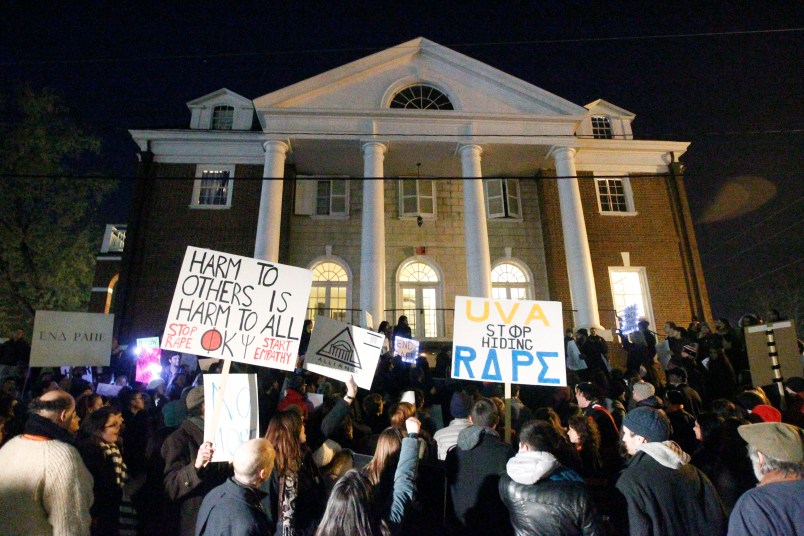Rolling Stone’s blockbuster story about a horrific alleged gang rape at a University of Virginia fraternity began to unravel Friday as the magazine said it “misplaced” its trust in the victim and the Washington Post poked holes in her account.
But just because certain details in the article didn’t check out doesn’t mean that the subject, Jackie, was never assaulted, experts say, nor does it mean that the problem of rape and sexual assault on campus is a myth.
And the high-profile way in which Jackie’s story as told in Sabrina Rubin Erdely’s Rolling Stone piece began to unravel, with even some of her closest friends now questioning the account she gave, may have a ripple effect on other victims of sexual assault.
“The way that violence against women gets covered by the media absolutely has an impact on how the next survivor is going to report or respond or seek out help,” Lisa Maatz, the vice president of government relations for the American Association of University Women, told TPM in a phone interview.
Maatz said that it’s precisely because women don’t want to be tried in the press or in the court of public opinion on their university campus that sex crimes go unreported, despite their prevalence. Nearly one in five women will be a victim of sexual assault while in college, according to the federally funded Campus Sexual Assault Study.
That pre-judgement was evident in libertarian magazine Reason’s coverage of the initial doubts raised about Erdely’s reporting, which questioned whether the whole story was a “gigantic hoax.”
The writer of that piece, Robby Soave, also cast doubt on the extent of Jackie’s injuries and the nature of the alleged attack.
“One issue now being raised by skeptics is the nature of her injuries, which sound as if they would have required immediate medical attention. (According to the story, everybody involved was basically rolling around in broken glass for hours),” he wrote. “If the frat brothers were absolute sociopaths to do this to Jackie, her friends were almost cartoonishly evil—casually dismissing her battered and bloodied state and urging her not to go to the hospital.”
Sarah Cook, a psychology professor at Georgia State University, told TPM that the Rolling Stone debacle may increase skepticism of survivor’s stories as well as dampen women’s willingness to report sexual assault. But she stressed that those who experience traumatic events, as Jackie allegedly did, may misremember exactly what happened to them.
“Someone undergoing a violent assault may remember some details and not others, and may not remember some details until later,” Cook said in a phone interview. “It is a phenomenon that people’s recollections can be inaccurate because of the trauma.”
Allison Tombros Korman, the executive director of the nonprofit Culture for Respect, which works to strengthen sexual assault prevention efforts, didn’t want to speculate on the details of Jackie’s account but told TPM that it would be “unrealistic” to expect a victim of sexual assault to recount her abuse as she would talk about anything else in her day.
As for the media coverage of sex assault cases, Korman emphasized that the incidence of falsely reported cases is very low, despite recent questioning of women who’ve come forward publicly with stories of abuse.
“We want all women who’ve experience sexual assault to feel like if they come forward with their stories, they are going to be believed and they are going to be supported,” she said. “It’s incredibly important to have a fair investigative and adjudication process to make sure that a resolution can be reached, but nothing should dissuade people from coming forward with their stories.”
No matter what happens with Jackie’s story going forward, Maatz believes the student’s ordeal shows that the University of Virginia and other schools like it still have an obligation to address a larger culture that is unsafe for women.
Rolling Stone’s version of what happened to Jackie “struck a chord,” Maatz said. “And the reason why it struck a chord is because [sexual assault] is something that is happening over and over on college campuses across the country.”








When I read that the reporter and the magazine has acquiesced to the victim’s request that the reporter not speak to the person who she’s accusing of her sexual attack, I thought that this was journalism malpractice 101. What it shows is that in the overall concern for the victim actually weakened the legitimacy of the story. A publication just cannot allow a subject of a story to make unreasonable demands on the editorial process.
This revelation just may have undermined the exposure of rape in other circumstances via journalism.
This is a lame, lame story. You can’t make allegations like this and claim that it’s “unrealistic” to have the facts behind you. If she didn’t know what day it happened, what fraternity was involved, you’re damn right that she shouldn’t have reported an unverifiable account, regrettable as that may seem.
This is a mess - for multiple reasons. Chiefly because it pursued an issue of high importance with a an example case that was, yes- very dramatic, but - problematic. What then happens is that the dialog becomes fragmented - the urgently needed examination of the subject of sexual assault - and society’s general lack of diligence in pursuing the perpetrators becomes intermittently hijacked by heated inquiry about the veracity of this victim in this example case.
Frankly, this is not about Jackie - it is about the overall kinds of things that Jackie described - the kinds of things that go on all across this country - to many many many women - it is the big picture that must take center stage. This must not become micro focused on the dates, times, names of the Jackie story - this is far bigger - and as insensitive as it may sound - this is not an opportunity for Jackie’s individual story to go to trial.
Your comment is a mess and her unsupported allegations are certainly on trial. The interests of real victims are undermined by this, whether it was foggy memory, terrible journalism, or outright charade. Some victims you perhaps don’t mean may be the occupants of that fraternity who have already punched giant holes in her story. This entire sketchy affair is not good for them, for fraternities in general, and certainly not for women needing more security in their lives.
Good luck to you.